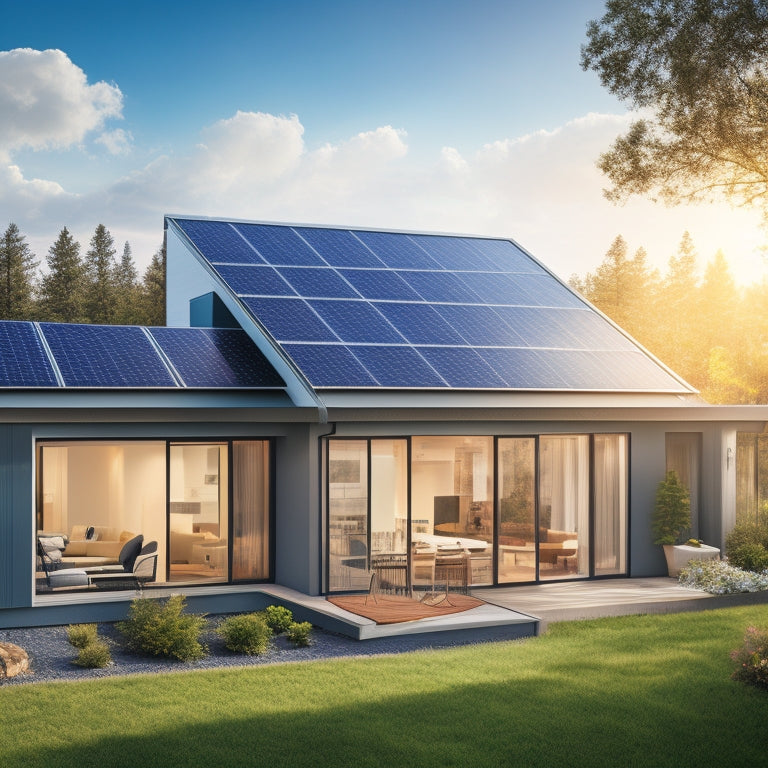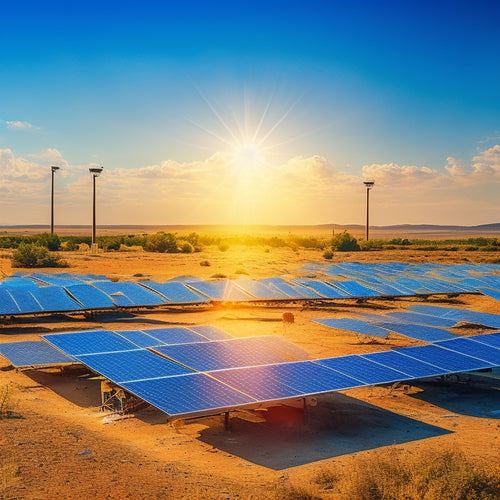
Complying With Local Codes for Energy Efficiency
Share
When installing solar panels, you're required to comply with local building codes and regulations to guarantee energy efficiency, avoid costly fines, and optimize your system's performance. You'll need to research specific zoning laws, obtain necessary permits, and select high-efficiency solar systems that employ advanced MPPT technology. Conducting energy audits and home retrofits can help identify areas for improvement, while understanding energy efficiency ratings like SEER and EER will aid in making informed decisions. By maneuvering the permitting and inspection process correctly, you'll avoid penalties and confirm your system operates at maximum potential - and that's just the starting point for creating a highly efficient solar installation.
Overview
- Research local building codes and zoning laws to ensure compliance with energy efficiency standards for solar installations.
- Conduct energy audits to identify areas for home improvement and determine necessary retrofits, such as insulation upgrades and energy-efficient windows.
- Obtain necessary permits and approvals prior to installation, including submitting detailed system information and paying required fees.
- Schedule inspections to ensure compliance with local building codes, including pre-installation, mid-installation, and final reviews.
- Non-compliance can result in significant fines, monetary penalties, and legal consequences, emphasizing the importance of adhering to local energy efficiency codes.
Understanding Solar Panel Efficiency
Optimizing your solar panel system's efficiency is vital to maximizing energy output and reducing your carbon footprint. By staying up-to-date with solar technology advancements, you can increase the amount of energy your system produces.
Regular cleaning can improve energy output by up to 25% Clean Panels for Maximum Energy, and real-time monitoring with smart sensors helps enhance production.
Improving installation practices is also essential, as even slight misalignments or shading can markedly reduce efficiency. You should verify your panels are installed at the best angle and direction, and that they're free from debris and obstructions.
Regular maintenance and monitoring can also help identify potential issues before they impact performance. By taking these steps, you can make the most of your solar panel system and enjoy the freedom that comes with generating your own clean energy.
Local Building Codes and Regulations
The local building codes and regulations that govern solar panel installations vary by region, and it's crucial you familiarize yourself with these requirements to guarantee compliance.
You'll need to research the specific zoning laws in your area to confirm your solar panel system meets the necessary standards.
When selecting a solar panel system, consider high-efficiency solar charging solutions that maximize energy harvest and employ advanced MPPT technology for peak energy capture.
Additionally, you'll need to obtain the necessary permits and approvals before commencing installation.
Failure to comply with local building codes and regulations can result in costly fines, penalties, or even system removal.
Energy Efficiency Ratings Explained
As you guide through the complexities of local building codes and regulations, it's equally important to understand the energy efficiency ratings that govern your solar panel system. These ratings determine the energy performance of your system, ensuring it meets the required standards. To help you traverse the various rating systems, here's a breakdown of the key ratings:
| Rating System | Description |
|---|---|
| SEER (Seasonal Energy Efficiency Ratio) | Measures the energy efficiency of cooling systems |
| EER (Energy Efficiency Ratio) | Measures the energy efficiency of cooling systems at a specific temperature |
| HSPF (Heating Seasonal Performance Factor) | Measures the energy efficiency of heating systems |
Understanding these ratings enables you to make informed decisions about your solar panel system, ensuring you meet local energy efficiency standards and enjoy the freedom to utilize clean energy.
Compliance Requirements for Homeowners
Meeting local building codes and regulations is essential for homeowners installing solar panel systems, and compliance requirements are no exception. You must guarantee that your system meets the energy efficiency standards set by your local government.
To achieve compliance, you may need to conduct energy audits to identify areas in your home that require improvement. Based on the audit results, you can perform home retrofits to increase your home's energy efficiency, such as optimizing load calculations to determine the total wattage of appliances and identifying opportunities for energy-efficient upgrades.
This may involve upgrading insulation, installing energy-efficient windows, or sealing air leaks. By taking these steps, you can guarantee that your solar panel system operates at its maximum potential and meets local building codes.
Navigating Permitting and Inspection
Several permits and inspections are typically required before, during, and after the installation of your solar panel system.
You'll need to maneuver through the permitting process, which may involve submitting plans and paying fees. Be prepared to provide detailed information about your system, including its size, type, and installation location.
Once you've secured the necessary permits, you'll need to schedule inspections to ascertain your system meets local building codes and inspection guidelines. These inspections may include a pre-installation review, a mid-installation inspection, and a final inspection upon completion.
Penalties for Non-Compliance Explained
You're likely aware that failing to comply with local energy efficiency codes can result in penalties, but you may not know the specifics.
Non-compliance can lead to fines and monetary penalties, which can be costly and impact your project's bottom line.
Additionally, legal and criminal consequences can also come into play, making it essential to understand the potential repercussions of non-compliance.
Fines and Monetary Penalties
One hundred percent compliance with local energy efficiency codes is essential, as non-compliance can lead to significant fines and monetary penalties.
You must understand the fines overview and monetary penalties associated with non-compliance. These penalties vary by jurisdiction, but they can be substantial.
You may face fines for each day you're out of compliance, which can add up quickly. Additionally, you may be required to pay monetary penalties for the energy wasted due to non-compliance.
These penalties are designed to encourage compliance, not to punish you. By understanding the potential consequences, you can take proactive steps to guarantee your building meets local energy efficiency codes.
Legal and Criminal Consequences
In the event of non-compliance, your business may face legal and criminal consequences that extend beyond monetary penalties.
You could be held criminally liable for violating energy efficiency codes, leading to fines, imprisonment, or both.
Additionally, legal repercussions can result in civil lawsuits, injunctions, or other court orders that restrict your business operations.
Failure to comply can also lead to criminal liability, damaging your reputation and putting your business's future at risk.
It's crucial to understand that non-compliance is a serious offense that can have far-reaching consequences.
Frequently Asked Questions
Can I Install Solar Panels on a Historic Home?
You can install solar panels on a historic home, but you'll need to balance energy efficiency with historic preservation, ensuring solar aesthetics align with the original design, and potentially consulting with local preservation societies for approval.
Do Energy-Efficient Upgrades Increase Property Taxes?
You'll find that energy-efficient upgrades typically won't increase property taxes, as the tax assessment is based on property value, which isn't directly impacted by upgrades; however, increased property value due to these upgrades might lead to higher taxes.
Are Energy Storage Systems Subject to Local Codes?
Fast-forward to a future where energy independence reigns, but for now, you must steer through modern energy storage regulations, ensuring your battery installation meets local codes, avoiding costly reworks, and securing your freedom to utilize renewable energy.
Can I Claim Tax Credits for Energy-Efficient Renovations?
You'll need to maneuver through tax credit eligibility for energy-efficient renovations, ensuring you've got thorough renovation documentation to back up your claims, as you'll be audited if you can't prove compliance with federal and state regulations.
Do Local Codes Apply to Rental Properties Differently?
You'll find that local codes apply to rental properties differently, as rental regulations often prioritize tenant rights, such as ensuring habitable conditions, over energy efficiency standards, which may not be as stringent for existing rentals.
Ready to Buy
As you traverse the intricate terrain of energy efficiency, remember that compliance is the key to revealing a sustainable future. Like a puzzle, each piece must fit perfectly - from understanding solar panel efficiency to steering through permitting and inspection. Don't let non-compliance cast a dark shadow on your eco-friendly dreams; instead, shine bright with a thorough understanding of local codes and regulations. By doing so, you'll illuminate the path to a greener tomorrow.
Related Posts
-

Top Eco-Friendly Camping Equipment for a Sustainable Adventure
When you're camping with the planet in mind, opt for eco-friendly gear like tents made from recycled materials and bi...
-

What Happens Without a Charge Controller in Solar Panels
Without a charge controller in your solar panel system, you risk overheating batteries due to overcharging, which can...
-

Top Off Grid Solar Batteries for Renewable Energy
When seeking top off-grid solar batteries for renewable energy, consider options with advanced battery chemistry, suc...


